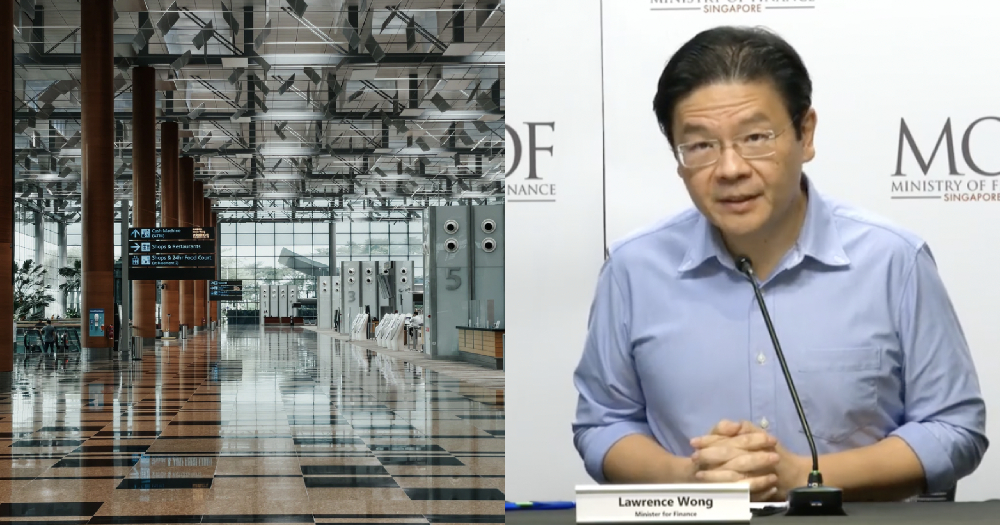Given that the region is still facing rolling waves of Covid-19 infection, there will not be "open and free travel" anytime soon, Finance Minister Lawrence Wong said in an interview with American news outlet CNBC on Wednesday, June 16, for the CNBC Evolve Global Summit.
Air travel will not return to pre-Covid levels for the time being
Speaking on managing the risks brought by the pandemic to changes in the supply chain, Wong said while there was "some impact" in the form of localised disruptions last year, the system has been "resilient" for the most part throughout the pandemic, and has been able to "adjust and cope".
However, on the prospects of air travel, he is "somewhat less sanguine" as compared to the outlook on supply chains and trade.
Besides the waves of infection the region is seeing, he added that vaccination rates for many countries regionally are "still not high enough".
But there might be some travel arrangements made among countries with low and stable infections, he said, adding that vaccinated travellers can perhaps see some benefits such as shorter quarantine times.
Nevertheless, even if some travel arrangements resume, "all of that is not going to add up to what we used to have pre-Covid", the co-chair of the multi-ministry task force said.
"Air travel, I’m afraid, will take some time to recover," he said.
When asked about air travel bubbles, Wong said he tries not to talk about them as "each time we talk about it, it gets burst and then we all start getting disappointed".
Even so, Singapore is continuing its talks and discussions with other countries. Wong said there is "a lot of interest" among countries where the infection rates are low and stable, including Singapore, to establish safe travel lines for two-way travel.
He added that when the government will announce the plans when they are finalised.
Cautious reopening
As for the lifting of restrictions in Singapore, Wong added that the government is reopening the economy in "a controlled manner" instead of "restarting everything all at once", after seeing a general decline in infection rates.
In addition, as vaccination rates in the population continue to rise, there will be greater confidence to ease up on restrictions further, he said, adding that he hopes to see at least 50 per cent of the people in Singapore get vaccinated fully by "around August".
Singapore will adjust tax systems to be in line with global consensus
On the topic of tax increases, given that the Group of Seven (G7) nations have recently agreed to back a global minimum corporate tax rate of at least 15 per cent, Wong was asked if Singapore would raise its corporate tax.
Saying that "those with means should pay their fair share of taxes", he also recognised that many developed countries with rapidly ageing populations find it hard to impose taxes on their population, and to do so on corporates as well as the corporate tax base is "increasingly mobile in this globalised world".
However, although he understands the increasing calls for increased pressures on international taxation systems and for there to be greater efforts to coordinate taxation systems globally, he said "the new rules cannot be set by the G7 countries alone".
A "multilateral consensus amongst all countries big and small" is needed to ensure "a level playing field across all jurisdictions", he said, adding that when these new rules are in place, Singapore will adjust its tax systems accordingly to be in line with the global consensus.
Wong added that it's a judgement call for each country to make when it comes to increasing its taxes.
He further said countries have to be careful that the new threshold of a minimum taxation rate does not end up being "a maximum rate" that would prevent them from generating more revenues than they would desire.
Singapore's headline corporate tax rate is a flat rate of 17 per cent, but Associate Professor Simon Poh of the NUS Business School pointed out in a commentary published on CNA that the effective tax rate of many companies in the country could be lower than this rate and "possibly even lower than 15 per cent".
You can read the entire transcript of his interview here.
Top image adapted via Lawrence Wong/Instagram & @shawnanggg/Unsplash
If you like what you read, follow us on Facebook, Instagram, Twitter and Telegram to get the latest updates.
